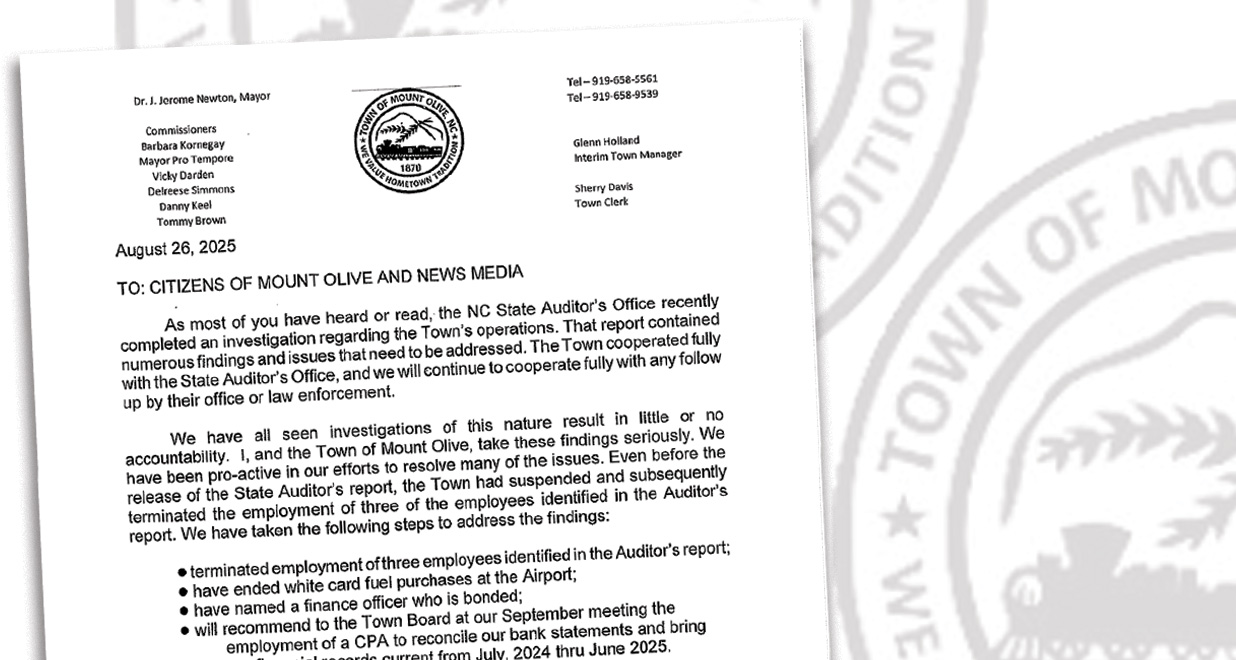Millions of gallons of wastewater were released into Stewarts Creek after Warsaw treatment plant failed
WARSAW —A significant wastewater spill in the town of Warsaw has raised environmental and public health concerns after several million gallons of wastewater were released into Stewarts Creek — a tributary of the Cape Fear River.
In a press release published on Aug. 27 on the town’s website, Warsaw officials revealed that a disruption at Warsaw’s wastewater treatment plant — triggered by an influx of industrial wastewater — forced operators to shut down parts of the treatment process and as a result, the wastewater flowing through the plant did not receive the required treatment before being discharged into Stewarts Creek.
System overloaded, treatment process compromised
Documents obtained by Duplin Journal show that on Aug. 18, the Warsaw plant’s operator alerted the Wilmington Regional Office of the Division of Water Resources (DWR-WiRO) of operational issues caused by excessive biological material.
“The high organic loading over the past month has resulted in increased sludge production,” the document stated. It noted that, under normal circumstances, the plant generates between 80,000 and 100,000 gallons of sludge, but this month that figure surged to between 600,000 and 800,000 gallons.
“The excessive sludge production coupled with a few weeks of high rainfall strained the health of the system. To mitigate this, the ORC (operator) reduced aeration to keep solids from exiting the plant via Stewarts Creek.”
By Aug. 22, the plant had become unstable, prompting operators to shut down components of the system to initiate a restart — while still receiving more wastewater than the system could manage. The document indicated that partially treated wastewater would be discharged directly into Stewarts Creek during this process.
“Over the past few days, the plant has been receiving over 1 million gallons per day (MGD) of influent whereas they are permitted for 0.915 MGD,” the report stated. “The next step is to pump out the aeration basins one by one and reseed the plant. Once a basin is taken offline, treatment capacity drops drastically, resulting in a bypass.”
Five-day delay in public notification
While the bypass was reported to regulators on Aug. 22, the public was not informed until five days later. On Aug. 27, the town posted a press release on its website; however, it did not include any warnings for downstream users to avoid fishing, swimming, or recreational activities in the affected waters.
Stewarts Creek is not just any waterway; it is part of a network that supports fishing, boating, and aquatic life. The creek flows into Six Runs Creek, which then leads to the Black River and eventually reaches the Cape Fear River — a major water supply for the region.
Anyone fishing, swimming, boating, or wading in Stewarts Creek or nearby waters may be exposed to harmful bacteria and pathogens. Potential health effects include rashes, gastrointestinal illness, and infections. Consuming fish from these waterways, particularly if undercooked or raw, may also lead to illness.
Sludge spread on farmland
Commissioner Ebony Willis-Wells, who alerted the public of the spill, also raised concerns regarding sludge transported from the treatment plant that was being applied to local crops.
Duplin Journal contacted Town Manager Lea Turner to confirm whether the sludge being sprayed on crops has been tested for pathogens, ammonia, and industrial contaminants. However, as of press time, Turner has not responded for comment.
Long-standing compliance issues
The ongoing wastewater treatment failures in Warsaw are part of a long-standing pattern of noncompliance, primarily due to persistent industrial overloading of the municipal treatment system from two major users: Villari Foods Group and C2NC.
For years, the plant has struggled to meet its National Pollutant Discharge Elimination System (NPDES) effluent limits. Over the past two years, operators have reported repeated failures, including the discharge of dark-colored effluent and low dissolved oxygen levels.
Villari Foods, a large meat processing facility, has been discharging waste with concentrations far exceeding permitted levels. In some months, discharges surpassed Biochemical Oxygen Demand (BOD) limits by nearly tenfold. Similarly, ammonia and nitrogen levels have consistently remained above allowed limits. These extreme organic and nutrient loads have overwhelmed the plant’s treatment capacity.

C2NC, a bioenergy facility handling agricultural waste, has been out of compliance since at least late 2024. Their ammonia and Total Kjeldahl Nitrogen (TKN) levels are alarmingly high — sometimes by a factor of 30 to 40. Equipment failures and high solids content have been cited as contributing factors. Like Villari, C2NC has missed self-imposed deadlines for achieving compliance and was formally ordered by the town to cease discharges in July 2025. However, a limited discharge of 100,000 gallons per day was conditionally approved while system modifications are underway.
It remains unclear when the wastewater treatment plant will be operational again. As of the date of the press release, the town of Warsaw was “working to bring the plant back online.”
A spokesperson with DEQ told Duplin Journal, “NCDEQ Division of Water Resources staff are working with the operator to bring the Warsaw Wastewater Treatment Plant back into compliance, and to address issues from industrial wastewater overloading the plant’s capacity.”
To date, the total paid in fines in 2025 is $144,234.57.
“DWR has advised the town that it needs to complete their Pretreatment Program so that the town can require more monitoring of discharges from their industrial users, and regulate them,” said the DEQ spokesperson.
“Regarding non-discharge permitting, Triple S Farms is required to sample the Town of Warsaw’s residuals. Due to the low volume of residuals generated for this facility, pathogens, nutrients and metals are monitored annually. This information is reported annually to DWR, but the town is the best source of information on hauling of sludge. Non-hazardous testing is conducted once per permit cycle.”
As of Sept. 3, Turner has not responded to any of our attempts for comment.

 Twitter
Twitter Facebook
Facebook Instagram
Instagram




